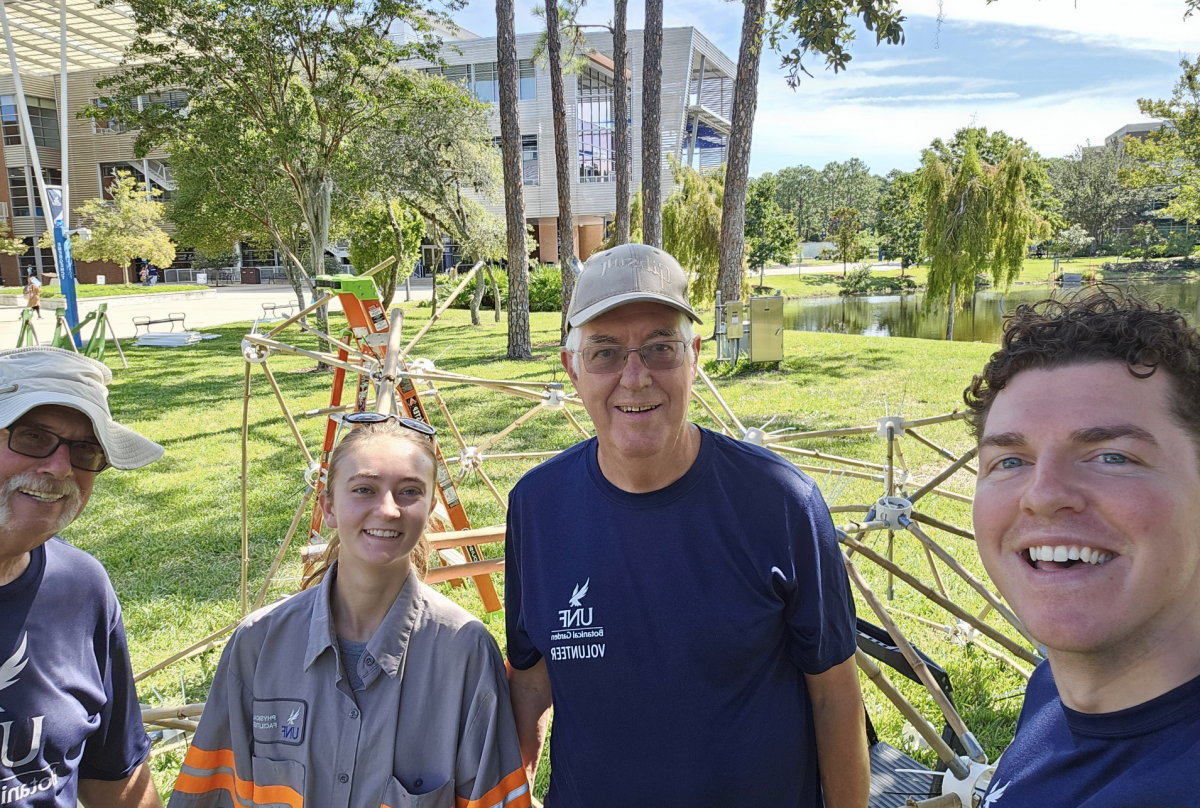No, you can’t work here. No, you can’t live here. No, that isn’t for sale. At least not for you, not for them. This is what individuals face in a culture of discrimination.
“Kick them all out!”
“Homosexuality should not be fostered or allowed.”
“Perversion is not something that should be accepted anywhere.”
These aren’t quotes from some heated protest against same-sex marriage. These statements are actual quotes and excerpts from real UNF students and faculty, found in the 2010 Campus Climate Survey. The point of the campus-wide survey was to gauge the general attitude and climate of LGBT affairs at UNF of both students and faculty. Some of this negativity was documented by the LGBT community at UNF, while others were direct responses written in the free area of the survey.
“You’re just confused. You haven’t found the right man yet.”
Imagine a life absent of trust. Imagine being afraid to be honest with your parents or friends about who you are. Even if they don’t hate you outright, they still might find a way to be unsupportive.
“Maybe it’s just a phase.”
At any time, if you identified outside of the acceptable representation of “male,” and “female,” or you were not strictly heterosexual, people were free to discriminate against you.
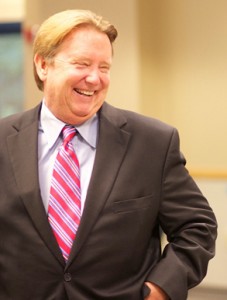
Photo by Blake Middleton
Back in 2004, current University of North Florida President John Delaney was still settling into his new job when a colleague surprised him with this fact.
“You know, you can fire me just for being gay,” Dr. Tom Serwatka said, who has been openly gay since he started working for UNF in 1975.
Delaney didn’t believe him at first. “No I can’t, there are laws against that.”
“No, John, there’s not.”
Delaney was shocked. After all, he had spent time as the chief assistant to a state attorney, and even served two consecutive terms as Jacksonville’s mayor. He was no stranger to public policy. “I’m a lawyer and I was not aware of the lack of protections for a group that has been historically discriminated against,” Delaney said.
This realization hit home for Delaney, and although he couldn’t change state or public policies, he could change university policies.
Humble Beginnings
Over the past decade, UNF has carved out a niche in Florida as an increasingly LGBT friendly university, a significant feat in the ultra-conservative Southeast. However, at the beginning of its inception, the LGBT community at UNF met significant obstacles and objections.
It began in 1994 when a small coalition of students founded the Lesbian, Gay and Bisexual Student Union. The club served not only as a place for LGBT individuals to gather and socialize, but as a place to do those things safely.
“The campus really represented the larger culture of Jacksonville, which is not very LGBT friendly. There’s not a lot of understanding about LGBT issues in the community, about who LGBT people are,” Kaitlin Legg said, assistant director of the LGBT Resource Center. “There aren’t any sorts of non-discrimination policies within the city of Jacksonville to protect LGBT people from [discrimination]. So, there was definitely a mix of not just apathy, but also downright negativity about LGBT people.”
As the new millennium approached, LGBT issues became increasingly relevant and reached more audiences across the country than ever before. Legislation began to pass, banning gay marriage in certain states. “Don’t Ask, Don’t Tell” was instituted in 1993, and the Defense of Marriage Act was passed in 1996. The atmosphere was worsening for LGBT Americans nationwide, and UNF was no exception.
In 2004, the LGBSU — now known as the Pride Club — suddenly found itself in the middle of a controversy that garnered a large amount of local scrutiny. Then president of the Pride Club Jeremy Lightner met with UNF administrators, raising allegations of discrimination against Student Government about his sexuality.
Jerry Watterson, student body president at the time, refused to sign funding for a Pride Club event, a drag-show meant to raise funds for treatment and prevention programs for pediatric AIDS. Citing religious beliefs as his reasoning, Watterson and LGBT suddenly found themselves in the spotlight of LGBT issues in North Florida.
“Based on my religious beliefs, I disagree with homosexuality, and therefore I couldn’t sign the bill,” Watterson said in a 2004 interview with the Spinnaker.
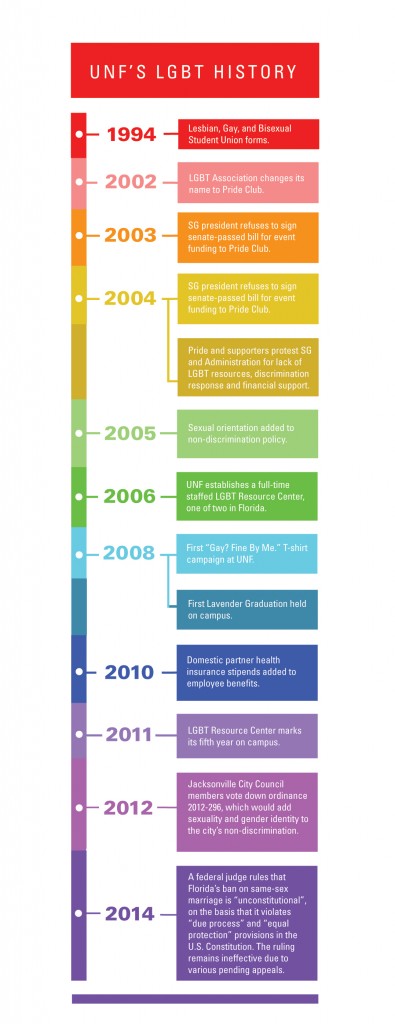
Prejudice
Watterson’s refusal to sign the funding request, which had already been passed by the Student Senate, did not prevent the drag show from happening. It did, however, delay the funding process — something that Lightner felt represented an overall mentality of homophobia that was present in both administration and SG.
“If I were student body president and I were to say that I’m not going to sign Intervarsity [Christian Fellowship] event form because I don’t believe in Christianity, there would be riots — huge riots across campus,” Lightner said in 2004. “Because his opinion agrees with the majority, its OK for his opinion to be discriminatory.”
Over the next few months, tensions began to escalate further. Delaney eventually addressed the student body, realizing that the matter was coming to a head.
“Clearly, we must discuss these incidents that have left lesbian and gay students marginalized and at risk,” Delaney said in an email to all students. “We need to ensure that we remedy these. A healthy campus cannot tolerate discriminatory acts,” Delaney said.
In 2005, the Committee on Equity and Civility at the University of North Florida chaired by Dr.
Mauricio Gonzalez, vice president for Student and International Affairs, conducted the first Campus Climate Survey. The results? Not so good.
Two-thousand one hundred seventy-two students responded to the questionnaire, as well as 356 faculty and staff members. Thirty-four percent of students and 50% of staff reported that they found UNF to be either unaccepting or very unaccepting of LGBT students. Furthermore, 26% of students and 25% of LGBT faculty and staff felt that LGBT individuals had reason to feel unsafe on campus.
Pride
It was at this time that Delaney and the rest of the administration made a move to add a non-discrimination policy that prohibited discrimination based on gender or sexuality.
Delaney eventually placed Gonzalez in charge of the creation of a LGBT Resource Center on campus. The Center would be staffed, and in 2006 became one of two full-time staffed LGBT Resource Centers in Florida. Furthermore, the university started to invest in diversity training.
“They required staff and faculty here to change the way that they think about, not only diversity, but their everyday practices,” Legg said. “When you’re at any place where primarily straight, white or male people are working, and this isn’t to harp on them at all, but when you have that perspective, sometimes you can’t see the barriers that are in the way for people who aren’t straight, white or male.”
Over the next few years, things began to improve. UNF added domestic partner benefits as an option for employees. In 2008, the first Lavender Graduation was held, as well as the first “Gay? Fine By Me.” T-shirt campaign. In 2010 domestic partner health insurance stipends were added to employee benefits, further expanding benefits for LGBT staff and faculty. Furthermore, the 2010 Campus Climate Survey showed significant improvement over the 2005 survey.
Looking Forward
Presently, UNF continues to strive to build a community based on acceptance and scholarship. In 2012 the non-discrimination policy was again altered to include transgendered people, a group that was overlooked when the policy was first introduced.
“UNF has protections for LGBT students, which is why I chose this college over others,” Haiden Baier said, President of the UNF Pride Club and a student assistant at the LGBTRC. “As a result, I found a family that I’m not willing to give up.”
Meanwhile, the LGBT Center has become one of the most active members of the student community, putting on numerous events each semester. The center also provides numerous educational resources and training sessions on LGBT subjects.
“I have become immersed in a community where we all, by and large, understand each other,” Christopher Jordan said, who serves as the Student Government Liaison and PR Coordinator for the UNF Pride Club. “The LGBTRC has served as a nexus for understanding sexuality and gender identification.”
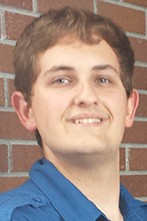
Despite significant improvement, however, equality is far from being reached. Just this February, a UNF student who identifies himself as a transgender male reported being subjected to verbal harassment and physical harassment from an unknown male while using a men’s restroom on campus. The victim reported that the suspect called him “an ugly man and an ugly girl” and went on to tell him that he didn’t deserve to live, according to the UNFPD report. Both UNFPD Interim Chief Strudel and Kaitlin Legg stated that this was the first reported hate crime at UNF. However, Legg did state that she had been informed of other, non-reported hate crimes.
Legg said that this incident could pose on on-going threat to transgender students at UNF, especially as the school grows in size.
The LGBT community hopes to further integrate equity into UNF by including LGBT issues in the curriculum, according to Serwatka.
“In Biology classes you’d learn about the genetic component, you’d learn about same-sex behaviors throughout the animal kingdom. In History classes you’d learn about Stonewall, which began the gay rights movement,” Serwatka said. “It would be nice to see it discussed, not that its an essential focus, but it’s included in all of these courses.”
While UNF continues to strive for equality, students may also consider looking outside of UNF and at the larger Jacksonville community for further improvement.
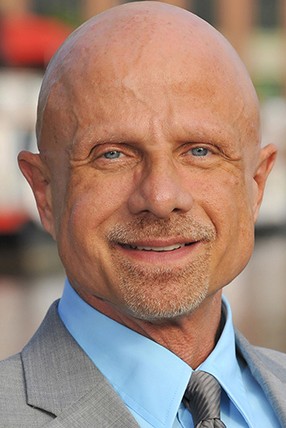
“There is no federal law, there is no state law, there is no city law,” Serwatka said in reference to non-discrimination policies. “Now, in many states there are laws, and in many cities there are laws. We just don’t happen to be in a state or a city that protects somebody [who is LGBT].”
In 2012, the Jacksonville City Council voted down a non-discrimination ordinance that would have protected homosexuals from various discriminatory acts. Currently, the non-discrimination policy only protects citizens on the basis of race, color, religion, sex, national origin, age, disability, marital or familial status. The ordinance, 2012-296, had a final vote of 10-9 against.
“I’m not out at work or outside of campus because I know I have zero protection,” Baier said, who identifies as a transgender male. “It needs to be stated that we can’t be fired for being who we are.”
The City Council’s decision actually puts Jacksonville in Florida’s minority. In fact, over 55% of Florida lives in a place that protects them from discrimination based on sexual orientation and gender identity, according to Equality Florida.
“Every major city in Florida other than Jacksonville has a non-discrimination policy or a human rights ordinance on the books that allows for non-discrimination in employment, in housing and in public accommodations for LGBT individuals,” Serwatka said.
Delaney, an active proponent of the ordinance, explained that not everyone is actually trying to “discriminate” against homosexuals.
“I put the opponents in kind of two camps: Those that are trying to reconcile homosexuality in America with their religious views; and then there is a group of just haters. I mean they are just mean, nasty haters,” Delaney said. “So we can condemn hatred and hostility and the nasty name calling, but the people that have legitimate religious views, I think we’ve got to respect them as well, as long as they aren’t actively discriminating against a gay citizen. I don’t agree with it, but i think it’s legitimate for them to have those views.”
Opponents of same-sex marriage may be on the losing side, however, as the issue seems like it’s headed towards the Supreme Court.
This past August, a federal judge officially declared that Florida’s ban on same-sex marriage is unconstitutional, citing various “due process” and “equal opportunity” provisions in the U.S. Constitution. Although this ruling has been federally mandated, it has not officially gone into effect due to pending appeals.
More than a dozen other federal judges have overturned similar bans in 13 other states, a result of the Supreme Court’s decision that the 1996 Defense of Marriage Act was unconstitutional. With the addition of the 19 states that have already legalized same-sex marriage, proponents of LGBT rights have suddenly discovered they are no longer a minority.
“Even in the elation of a favorable Supreme Court decision, it’s important to remember that there are other members of the LGBT community who still need our help and understanding,” Jordan said. “People who are [transgendered] still face an enormous social stigma and a lack of understanding.”
This year October will mark the 10th celebration of LGBT History Month in the United States, and for many it is a cause to celebrate. After all it was only 45 years ago that the Stonewall Riots took place, launching the grassroots gay rights movements into the national spotlight. Since then the progress of the movement has been lightning-fast, almost too fast for the non-obsessive to keep track of.
“The country has moved so far on this issue in just a short period of time,” Delaney said. “In fact there’s never been a social issue that there’s been such a complete shift.”
Email Alex Wilson at reporter15@unfspinnaker.com




